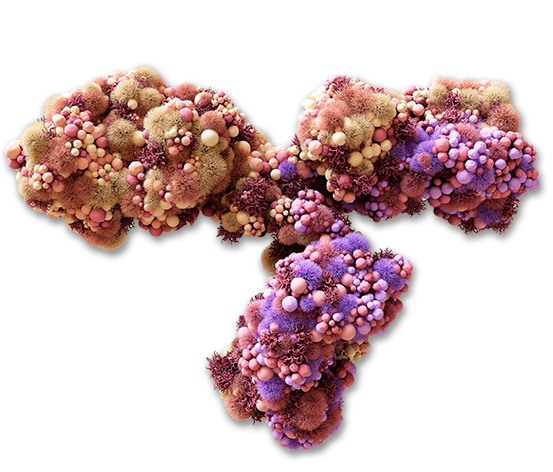Bioanalytical Solutions for
Large Molecule Development

Backed by our extensive experience in large molecule bioanalysis, Inotiv understands that every biotherapeutic is unique and requires a customized reliable bioanalytical solution. Our team of expert bioanalysts collaborate with you to develop a strategy that supports your compound’s journey from discovery through nonclinical and clinical development.
Early in your compound’s journey, we provide you with the insights needed to better understand the characteristics of your compound, potential biomarkers, and the best direction forward to improve your program’s probability of success. During the regulated pathway, we develop and validate assays that meet the requirements set by the FDA, EMA, and OECD guidance. We ensure every bioanalytical method meets your specific requirements with the end goal in mind, to provide you with actionable preclinical and clinical results to facilitate informed decision making to progress your program.
Bioanalytical Biotherapeutic Capabilities
You have access to a bioanalysis lab with a team that brings extensive experience in supporting pharmacokinetic (PK) and immunogenicity assessments, biomarker development, and gene and cell therapy programs across multiple biological matrices. We support biotherapeutic development from early discovery through regulated preclinical and clinical with our proven capabilities.
As an extension of your laboratory, our bioanalytical team utilizes state-of-the-art molecular and cell-based platforms to rapidly develop and validate methods to support the assessment of pharmacokinetic (PK)/toxicokinetic (TK)/pharmacodynamic (PD), immunogenicity, immunophenotyping, biomarkers, biosimilars, biobetters, gene therapy, vaccine endpoints, and analysis for other biotherapeutic programs.
Our Bioanalytical Testing Platforms:
- ELISA, HELISA
- Meso Scale Discovery (MSD) (single and multiplex)
- Liquid Chromatography, Tandem Mass Spectrometry (LC/MS)
- AB SCIEX™ Platform (4000, 5500, 6500, 7500)
- Luminex®
- DNA/RNA Isolation
- RT-PCR, qPCR
- Flow Cytometry
- FCS Express Software
- Cytokine Panels
- ELISpot
- Fluorescence and Luminescence-Based Assays
- Protein Expression Analysis
- Transporter Assays: Solution Carrier (SLC) and ATP-Binding Cassettes (ABC)
- Hepatitis B Virus (HBV) Titers
- Watson LIMS™
- Pharmacokinetics Phoenix™ WinNonlin™
- Noncompartmental PK Analysis

Biomarkers

Inotiv has extensive experience designing preclinical and clinical biomarker strategies to support your broader clinical development objectives. Our experts collaborate with you to identify biomarkers that will deliver the results needed to support your decision making.
Our specialized biomarker services include:
- Guidance on the optimal selection of biomarkers in the context of your drug candidate, target disease, and project budget
- Development, optimization, and validation of biomarker assays across a wide range of matrices and technology platforms
- Biomarker analysis of preclinical and clinical samples for exploratory or clinical trial settings
- Explanation/interpretation of results and advice on key outcomes and decisions to be made about candidate therapies
Our biomarker strategies encompass the full biological spectrum, including DNA, RNA, protein, cell, and tissue analysis, matched with proven and trusted technology platforms. To learn more about our biomarker solutions for biotherapeutics, click here.
Cell and Gene Therapies

Our biotherapeutic team of scientists come with a wide range of experience in cell and gene therapies, enabling us to provide integral guidance for your study. Depending on your specific requirements, we can either select the right assays for your gene or cell therapy product from our standard bioanalytical service offerings, or work with you to develop novel assays to suit your needs.
Flow Cytometry and Applications

Inotiv’s flow cytometry team of experts specialize in customized flow cytometry panels in early-phase preclinical and clinical trial research and are equipped to process samples from a wide range of matrices, from fresh to cryopreserved.
We analyze samples using a variety of sophisticated approaches, including multimer, phospho-flow cytometry, and receptor occupancy (RO) assays. We utilize dedicated peripheral blood mononuclear cell (PBMC) processing units that are linked to biosafety level 2 (BSL2) cell culture laboratories. To learn more about our flow cytometry capabilities click here.
Vaccines

Our experience and understanding of the science of immunobiology, underpinning health and disease, empowers us to provide expert guidance in supporting vaccine development across a wide array of therapeutic areas, including COVID-19.
Biosimilars

Biosimilars are a fast-growing sector within the pharmaceutical industry. Our record of success in this field makes us well suited to provide high-quality, deeply informative, and relevant bioanalytical expertise to facilitate your therapeutic’s development.
Bioanalytical Large Molecule Team

The biotherapeutics laboratory team is led by Kenneth Swart, MMedSc, PhD, a seasoned researcher with over 45 years of experience in the field of bioanalysis, biotherapeutics, and biomarkers supporting the progression of drug development programs from within a CRO environment. He has extensive experience across multiple therapeutic areas including vaccines, inflammation, immunology, oncology, autoimmune diseases, CNS, dermatology, rare diseases, and cardiology, and has supported more than 4,000 clinical and non-clinical studies.
Dr. Swart leads a competent team of scientists with multiple years of experience in flow cytometry, immunochemistry, PK/TK, immunology & immuno-oncology, and molecular biology. This group of senior scientists has published more than 120 articles and presented numerous presentations at conferences and workshops in the field of bioanalytical chemistry, inflammation, cytoskeletal reorganization, inflammatory immune responses, cancer research, immunotherapy, and vaccines. As your partner, you have access to a team that comes with a wealth of knowledge and provides you with the insights needed to progress your compound through its development stages.
Frequently Asked Questions (FAQs) for Bioanalysis Large Molecules
What challenges do modern bioanalytical laboratories face, especially with the introduction of novel biotherapeutics?
The emergence of novel biotherapeutics has had a major impact on the way we approach bioanalytical support, and it requires laboratories to offer a wider range of services with more sensitive techniques. Some of these techniques produce larger data sets, e.g., next-generation sequencing (NGS) data, to be analyzed and interpreted. This then requires the application of a more sophisticated data reduction software and a bioinformatics team. The absence of regulatory guidance for some techniques is also causing issues and, in most cases, best practices must be followed.
Traditionally, most drugs were small-molecules requiring an LC-MS platform, and for some of the large molecules, basic ELISA and RIA support was sufficient. However, with the introduction of large molecule protein drugs such as antibodies, fusion proteins, growth factors, and recombinant peptides, the traditionally used LC–MS platforms were inappropriate to analyze these molecules, although much progress has been made in this field. In addition, the greater size and complexity of these molecules has increased the need for time in extensive sample preparation prior to sample analysis.
Historically the dominant form of bioconjugates were antibody-drug conjugates (ADCs) and used in oncology. However, recent implementation of bioconjugate therapeutics has been expanded into immunosuppressive, anti-inflammatory, and antimicrobial indications. For an ADC treatment, where an antibody targets a specific receptor expressed by cells and an attached drug (payload) mediates the therapeutic response, analysis of the biomolecule and the payload are required. This analysis is often performed using different techniques and platforms and requires bioanalytical scientists to have a much larger level of expertise in immunochemistry, immunology, and molecular biology.
What are the challenges associated with cell and gene therapies?
The analysis of cell and gene therapeutic agents including oligonucleotides, require additional bioanalytical technologies such as ELISpot, different forms of hybridization immunoassays (HELISA), qPCR, and flow cytometry beyond the conventional ligand binding assays (LBA) and LC-MS platforms. It also requires the analysis of the Adeno-Associated Virus (AAV) capsid, and transgene expressed proteins in different tissue samples. However, there are accompanying issues coming from the lack of regulatory guidance on the levels of validation required which we must navigate.
So overall, depending on the molecule's structure, stability of the compound, matrix interferences, etc., multiple assay platforms may be required.
What are the challenges for immunogenicity determinations?
Immunogenicity determinations normally require a multi-tiered approach which includes screening, confirmatory, titer, and neutralizing assays. However, in the case of vaccines where one expects to have overwhelming anti-drug antibodies ADAs to be formed, alternative approaches might be more relevant.
Clinical development of gene therapies (GTx), such as oligonucleotides and cell therapies (CTx) involve extensive and challenging immunogenicity and pharmacokinetic assessments. The challenges associated with immunogenicity assessment are due to the unique delivery systems and complex nature of the immune responses against these multicomponent drug modalities.
Additional challenges for immunogenicity assays are associated with the lack of availability of critical reagents, such as capturing and detection antibodies, positive controls, and appropriate cell lines. Since viral vectors are commonly used for gene therapy, bioanalytical methods need to assess pre-existing and drug-induced humoral ADA and cellular responses against adeno-associated virus (AAV) capsid and transgene expressed proteins.
Immunogenicity assays also requires immunogenicity assessments of the intact molecule, each functional domain, linkers, the degraded form, metabolites, and the combination thereof.
What bioanalytical testing services and solutions does Inotiv offer for these challenges and how are you integrated?
Inotiv is a full service preclinical CRO that offers bioanalytical services for the development of compounds from discovery through regulated development in preclinical and clinical stages.
Where appropriate, we use the same instrumentation and standard operating procedures (SOPs) across multiple laboratories. By using the same methodologies throughout the progressive phases of development, it makes the method transfer, validation, and interpretation of the data seamless.
We offer a full bioanalytical solution from discovery to regulated GLP/GCLP analysis of small molecules, monoclonal antibodies and novel biotherapeutics. This includes bioanalytical method development to full validation (MDV) for pharmacokinetics (PK), immunogenicity, receptor occupancy, and biodistribution in different tissues for different species. We also cover the full spectrum of biomarker analyses including DNA, RNA, soluble biomarkers (like cytokines), biomarkers of toxicity & efficacy, immune, and genomic markers. We apply different techniques such as LC-MS and single and multiplex ligand binding assays such as ELISA, MSD, Luminex®, flow cytometry, ELISpot, and RT-PCR.
What problems are associated with measuring the ability of a target system to respond to a drug treatment and does Inotiv offer a solution?
One big problem in drug development is how to measure the ability of a target system to respond to a drug treatment since it would require direct quantitative analysis of cells and tissues including formalin-fixed, paraffin-embedded (FFPE) treated cells.
The ability of a target system to respond to a drug depends on:
- The abundance of the target
- The abundance of other key system proteins
- Other proteins that control the tissue phenotype
These are very difficult to measure quantitatively due to the complexity and condition of different matrices and tissue samples, and this require an alternative technique to immunohistochemistry, since IHC is not quantitative enough.
Inotiv’s solution is the offering of a platform called Target Sufficiency®. Our platform is built on high resolution proteomic targeted mass spectrometry (MS), which provides precise, sensitive, and specific measurements. Analyses are multiplexed, which enable simultaneous measurements of dozens of proteins per sample.
Target Sufficiency® enables direct, quantitative analysis of drug target systems in cells, tissues, and tissue models. This includes FFPE tissues, directly integrating protein-level pharmacology and pathology across multiple therapeutic areas, such as, oncology and autoimmune diseases, from discovery through clinical development. Learn more about Target Sufficiency®.



